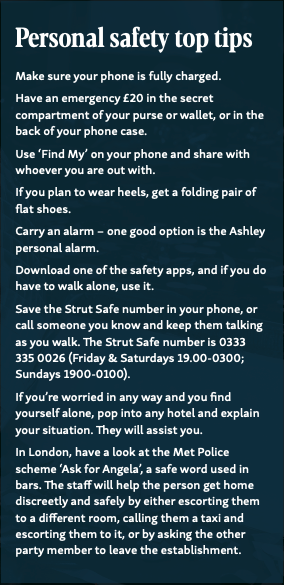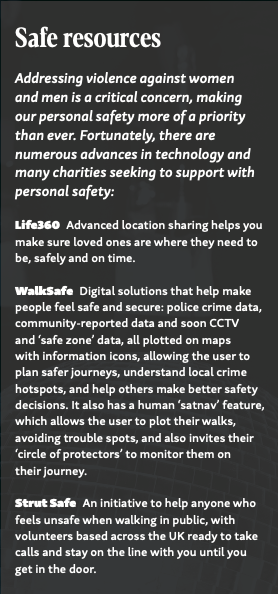It’s that time of year when we start to reflect on the ups and downs of the past 12 months and plan for what the new year will bring. This means our social calendars go into overdrive, often being out late at night and even staying in hotels. It’s a merry time of year, as we get in the mood with questionable Christmas jumpers, too much tinsel and party poppers, while trying out new cocktails and singing ‘All I Want for Christmas’ better than Mariah Carey herself.
Joking aside, it can be easy to find ourselves in situations we hadn’t planned for, so it’s key to make sure you have everything covered to ensure you stay safe and have a wonderful time with no regrets. I write this article with my own experience in mind, and I’m sure I am not alone in finding myself in a tricky situation that led me to re-evaluate my approach to a night out, which is why it is worth talking about personal safety.
According to the Ministry of Justice, there were an estimated 430,000 to 517,000 adult victims of sexual offences in the last year in England, with figures for the rest of the UK making this number even higher. However, only 15% of serious sexual offences and 21% of partner abuse incidents are reported to the police, says charity Rape Crisis. More worryingly, 20% of women and 4% of men have experienced some type of sexual assault since the age of 16.
Safety when out late at night
It’s important to plan your evening and share with who you are out with. Whenever possible, travel with colleagues and friends or in groups. There’s safety in numbers, and potential attackers are less likely to target a group. Stick to well-lit streets and populated areas. Avoid shortcuts through dark alleyways or parks. If you leave alone, let your group know and make sure you agree to let them know when you are home. Use a WhatsApp group and share your location.

When using taxis try to travel together, and check the taxi identification. If using Uber, confirm the driver’s identity and match the vehicle details provided in the app before getting in. Always ask the driver to wait until you have got inside your destination.
There are other considerations on a night out. Drink spiking is on the rise, so always buy your own drinks and don’t leave it unattended. Avoid drinking too much alcohol, especially in unfamiliar situations – it could increase the likelihood of risk taking and make you less aware of danger. Don’t accept any drinks from anyone you don’t know well. Accompany the person to the bar if you do wish to accept the offer of a drink, and take the drink from the bartender yourself.
Navigating peer pressure
Ensuring personal safety involves not only being aware of physical threats but also recognising and responding to social pressures. Equipping yourself with strategies to handle these situations can significantly enhance your safety and wellbeing.
Set personal boundaries. Knowing your limits and being confident in your choices will help you resist peer pressure more effectively. Most people will respect your choices if you communicate them clearly.
Our personal safety is non-negotiable, and knowledge is a powerful tool in staying safe. By following these guidelines, we can take proactive steps to protect ourselves in various situations. Everyone deserves to feel safe and enjoy their experiences to the fullest. Trust your instincts. If you find yourself in a situation that feels unsafe or uncomfortable, then leave. Your wellbeing is your top priority!
Know your safe spaces
In my case, I was able to use a known hotel chain as a safe space, something many of us may not realise. Recently, I caught up with Paul O’Grady, assistant director of security at the Four Seasons Hotel in London.

While hotels are a good stop-in when you need to call a cab, or step out of a dangerous situation, he also shared various tips on how to stay safe during your stay if you have booked a room: “Choose your hotel carefully with good reviews and security, preferably in metropolitan areas rather than ones on hidden away quiet roads. Request a room on higher floors, away from secluded areas like stairwells or service entrances. Try to avoid misplacing your room key by keeping it in a wallet, purse or bag when not using it and be mindful about being overheard if sharing your room number while in a public place.
“Don’t get into the same lift with anyone you feel uncomfortable with. If you feel in danger with anyone that gets into the lift with you or feel you are being followed, then don’t get out, go back down to the reception and report your concern.
“Double-lock your door before you go to bed or for that added protection if you’re alone in the room. Ensure your room has a deadbolt lock and a peephole and use them to verify the identity of anyone knocking on your door before opening the door to any strangers. Staff will always announce themselves when knocking. If you aren’t expecting a visitor, do not open the door and call reception [or] security.
“Don’t leave luggage unattended. Hotel lobbies attract thieves who have devised clever strategies to commit crimes. If possible, keep your luggage in front of you or in eyeshot and at arm’s length. Most hotels will have a luggage store – use it. Hotel bars and restaurants will also have some form of bag and coat check, where your items will be stored away safely and recorded.”
Tracie Burton is senior corporate account manager at HSBC UK Intermediary Mortgages



